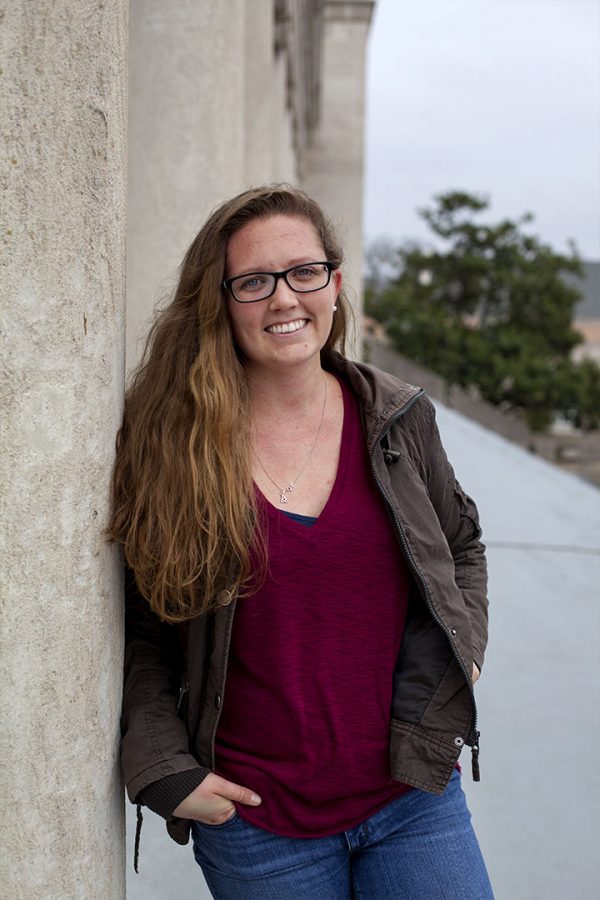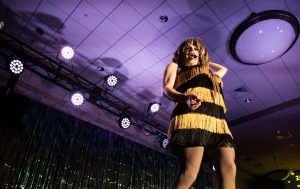Student returns to WKU after Peace Corps service
December 1, 2016
Imagine living alongside a river, in a suburb of a large city about a half hour away. Only this suburb is a village of around 50 people, and your primary transportation is done through biking and walking.
Lauren Van Sicklin, a graduate student from Long Island, New York, hadn’t guessed she’d be waking up in a bamboo hut covered by a palm-leaved roof. But for more than two years, that’s precisely what she did during her Peace Corps service in a rural village in Madagascar.
“It was just like the most incredible thing I’ve ever done,” Van Sicklin said.
Van Sicklin is one of two WKU students that have participated in the WKU-Peace Corps Master’s International program, a way for students to volunteer while furthering their education. Partnered universities offer graduate students a format to study beforehand, serve in the realm of their discipline and come back to finish out their degree.
Van Sicklin finished her undergraduate degree in biology and was deciding her next steps when she came across this program opportunity. Serving in the Peace Corps had always been something in the back of her mind but finding a way to pursue a master’s degree at the same time led her to reach out to partnering universities across the U.S., eventually deciding to go through WKU’s.
The program as it stood at WKU offered opportunities within the fields of biology and organizational leadership. WKU is the only school that offered the program in Kentucky, something that was mainly spearheaded by Lawrence Alice, associate professor of biology and university coordinator for the program.
After one year of academics at WKU, Van Sicklin was able to apply and be accepted as a volunteer. It was determined she would work with the Madagascar Fauna and Flora Group. The organization works in conjunction with Madagascar’s government in order to preserve the country’s biodiversity by utilizing “sustainable conservation strategies for the fauna and flora of eastern Madagascar,” according to its website.
For about three months while in the country’s capital, Van Sicklin went through an intensive training period with other Peace Corps volunteers, learning more about Madagascar’s culture and language before being dropped off in the village of Ambonivato, which she says translates to “on top of a rock”. The village was near the park that she would proceed to work on projects with relating to conservation.
As a part of her service, Van Sicklin acted as a liaison between the park and the surrounding villages, working to help bridge the gap in order to promote environmental education. She helped work with different outreach and educational programs that focused on things like reforestation and sustainable agriculture as well as how it relates to food security.
“It’s so connected,” she said. “You know you can’t protect the forest unless you help the people living there because they are so reliant on that forest.”
Living in the village enabled her to build trust with the local community. People operated on “Africa time”, where people were not rushed and you could randomly talk to anybody.
“Anywhere I walked in Madagascar,” Van Sicklin said. “Someone would always be like ‘Hey, what are you doing — can I walk with you?’”
Before starting her service, Van Sicklin had been worried about the language barrier. The Peace Corps gave her several dictionaries and language training books. The official language of what was once French-colonized Madagascar is now French and Malagasy.
“When you’re thrown into it, you get used to it pretty quickly,” she said. “You kinda have no choice.”
She became friends with a Malagasy woman in the village who was learning English. The two would make lists of unknown foreign words and help teach each other.
Van Sicklin returned to the U.S. this summer, wherein she has taken this semester to finish her master’s degree.
The Master’s International partnership began at WKU in 2010, until Peace Corps made the decision to dissolve the program nationwide this fall and instead “focus on other strategic partnership opportunities,” according to their website.
With this in mind, Alice, a Returned Peace Corps Volunteer himself, discussed the desire to propose bringing the Paul D. Coverdell Fellows Program to WKU. He said the program would incentivize RPCVs to pursue their graduate degree with a 50 to 100 percent tuition coverage granted by the university. The university, in exchange, would be bringing in more students with different international perspectives. He hopes that more departments would get on board if a program like this were to come to WKU.
“You bring all those intangibles from the Peace Corps experience,” Alice said. “With our motto of international reach, we get international reach day one on campus for the next two years.”
Following graduation, Van Sicklin no longer sees herself being an animal biologist as she had once thought before her service in Madagascar. She’d like to pursue holistic conservation instead. To her, working as a Peace Corps volunteer made the “whole world itself seem a lot smaller.”
“Everyone has the same basic goals in life. You want to be successful, you want your children to have a better life than you have,” she said. “…everyone’s just trying to figure out how to do that the best way they can.”
Reporter Madison Martin can be reached at 270-745-2655 and [email protected]. Follow her on Twitter at @missmadielaine.






















![Megan Inman of Tennessee cries after embracing Drag performer and transgender advocate Jasmine St. James at the 9th Annual WKU Housing and Residence Life Drag Show at Knicely Conference Center on April 4, 2024. “[The community] was so warm and welcoming when I came out, if it wasn’t for the queens I wouldn’t be here,” Inman said.](https://wkuherald.com/wp-content/uploads/2024/04/smith_von_drag_3-600x419.jpg)


